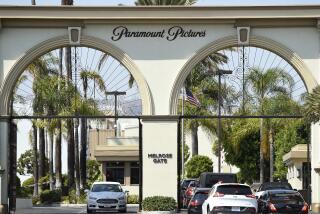Judge Says ‘Monty’ Suit Better Addressed in Britain
- Share via
A federal judge on Wednesday dismissed a copyright infringement lawsuit claiming the hit film “The Full Monty” ripped off a New Zealand play, ruling that the suit should have been brought instead in Britain, where the movie was written and made.
U.S. District Judge Gary Taylor’s ruling does not kill the lawsuit. Rather, Taylor said he believes Britain is a better place to try the case than Los Angeles.
In March, New Zealand playwrights Andrew McCarten and Stephen Sinclair sued 20th Century Fox, which made and financed “The Full Monty” through its Fox Searchlight Pictures. The two claimed the comedy about a group of unemployed male factory workers who become strippers to earn money was stolen from their 1987 hit New Zealand play “Ladies Night.”
Nominated for a best picture Oscar, “The Full Monty” is one of the most profitable films in the 1990s. With a budget of only $3.5 million, the film has grossed more than $200 million at the box office and has been a successful video as well.
McCarten and Sinclair filed the lawsuit as Oscar voting was starting, although it is unlikely that it affected what eventually became a virtual sweep of the awards by “Titanic.” Also named in the suit were writer Simon Beaufoy, producer Uberto Pasolini and director Peter Cattaneo, all residents of Britain. Pasolini has said that no one connected with the film had any specific knowledge about “Ladies Night” when the film was made.
An order that effectively shifts the lawsuit out of the U.S. is a victory for Fox because, legal sources said, whatever decision is made in a foreign court might not be easily applied in the U.S.
Lawyer Bert Fields, who represents Fox, argued that key witnesses to the case are in Britain, adding that there is no assurance they could be made to appear in a U.S. trial.
McCarten and Sinclair now have several choices. They can appeal Taylor’s decision, file their infringement suit in Britain or file the case in their native New Zealand.
Lawyer Don Engel, who represents the two, would not comment on the ruling, except to say that “the alternatives are interesting.”
More to Read
The biggest entertainment stories
Get our big stories about Hollywood, film, television, music, arts, culture and more right in your inbox as soon as they publish.
You may occasionally receive promotional content from the Los Angeles Times.










